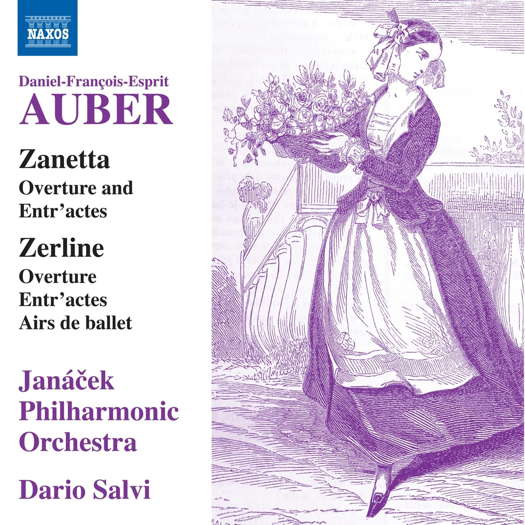 SPONSORED: Ensemble. Last Gasp of Boyhood. Roderic Dunnett investigates Jubilee Opera's A Time There Was for the Benjamin Britten centenary.
SPONSORED: Ensemble. Last Gasp of Boyhood. Roderic Dunnett investigates Jubilee Opera's A Time There Was for the Benjamin Britten centenary.
All sponsored features >>
- Daniel Schorno
- Dame Janet Baker
- Teodor Zgureanu
- Thomas Gould
- Rebecca Schmid
- Sheku-Kanneh Mason
- Pygmalion
- Ian Stephens: Clarinet Quintet
 DISCUSSION: John Dante Prevedini leads a discussion about Composers, individuals or collective?, including contributions from David Arditti, Halida Dinova, Robert McCarney and Jane Stanley.
DISCUSSION: John Dante Prevedini leads a discussion about Composers, individuals or collective?, including contributions from David Arditti, Halida Dinova, Robert McCarney and Jane Stanley.

Very Rare Stage Works
GERALD FENECH listens to music by Auber
'... committed vigour and passionate warmth.'
Daniel François Esprit Auber (1782-1871) was born into an artistic family. Auber was at first an amateur composer before he took up writing operas professionally when the family's fortunes went bust in 1820. He soon established a professional partnership with librettist Eugene Scribe that lasted for forty-one years and produced thirty-nine operas, most of them commercial and critical successes. He is mostly associated with opera-comique, composing thirty-five works in that genre.
With Scribe he wrote the first French grand opera, La Muette de Portici, in 1828, which paved the way for the large-scale works of Giacomo Meyerbeer. Auber held two important official musical positions. From 1842 to 1871 he was director of France's premiere music academy, the Paris Conservatoire, which he expanded and modernised. From 1852 until the fall of the Second Empire in 1870 he was director of the Imperial Chapel in the Louvre, for which he wrote a substantial number of liturgical works apart from other religious music.
A devotee of Paris, Auber refused to leave the city when the Franco-Prussian War led to the siege of Paris and the subsequent rise of the Paris Commune. The French Government regained the capital in 1871, but by then the composer had already passed away in his Paris home, aged eighty-nine.
This latest volume in the ongoing Naxos cycle focussing on Auber's orchestral operatic output is indeed timely, as the programme brings into perspective two very rare stage works that are hardly ever performed, the operas Zanetta and Zerline. Zanetta, an opera-comique in three Acts to a libretto by Scribe and Jules Henri Vernoy de Saint-Georges, was premiered on 18 May 1840 at the Opera-Comique. Set in Naples in the early 1740s, it is the second of Auber's three Sicilian operas along with Actéon and Zerline.
Listen — Auber: Overture (Zanetta)
(track 1, 0:00-0:46) ℗ 2021 Naxos Rights (Europe) Ltd :
Act I opens with Charles VI thinking that his favourite German nobleman, Rodolphe, has set his eyes on his sister Nisida. In order to allay her brother's suspicions, Nisida conceives a plan in which Rodolphe will openly court Zanetta, the daughter of the royal gardener. Zanetta duly responds to Rodolphe's advances.
In Act II Nisida becomes jealous of Zanetta and tries to hurt her by showing her one of Rodolphe's love letters, but the girl cannot read German and thinks that it is the fulfilment of a promise to bring her father to the King's attention. Zanetta shows the letter to Baron Mathanasius, a councillor of the Elector of Bavaria. Recognizing it is a tryst for that evening, the Baron orders an ambush for Rodolphe while on his way to see Nisida. On his journey he meets Zanetta and rashly rebuffs her for being late.
In Act III Rodolphe meets Nisida accordingly, but she learns that he has duped her. Enter Zanetta with her demonstrations of love and this convinces Rodolphe that he has behaved wrongly. Nisida, on her part, is offered the Elector's hand in marriage following a plan hatched up by the King and the Baron. She accepts willingly, and the opera ends positively for all concerned.
An opera in three Acts to a libretto by Scribe, Zerline was premiered at the Academie Nationale de Musique on 16 May 1851. Set in Palermo during the Restoration, the work opens with the Prince of Roccanera, married to the King's sister, who has a supposed niece Gemma. She is really his daughter by Zerline, an orange-seller. The latter was abducted by pirates, and having returned to Palermo after many trials, now meets her daughter, assuming the role of her aunt. She learns that Gemma loves Rodolphe, a young naval officer, but that the Prince's wife wishes Gemma to marry the King's cousin, much against the girl's wishes. In Act III, Zerline, already alerted to the goings-on that are compromising the two lovers, succeeds in safeguarding their integrity and bring about the fulfilment of their dream.
Listen — Auber: Overture (Zerline)
(track 5, 2:04-2:59) ℗ 2021 Naxos Rights (Europe) Ltd :
There's not much of a plot in either work, I must say, but in the history of opera there are many instances where a poor libretto did not hinder the flow of some truly great music. Verdi's Il Trovatore comes readily to mind. Well, Auber's music is an absolute delight with its lively spring and sparkling orchestration, not to mention the melodic abundance and piquant orchestral textures that jump out of every page. What I find thrilling in this composer is his looking back to Rossini and forward to Smetana, while keeping his voice well to the fore.
The programme also includes the world premiere recording of the Quadrille No 2 on the opera Zanetta by Philippe Musard (1792-1859), a delightful miniature that shows the extent of Auber's contemporary popularity, and a revealing souvenir of the cultural tastes of the period.
Listen — Philippe Musard: Quadrille No 2 on the opera Zanetta
(track 4, 0:00-0:57) ℗ 2021 Naxos Rights (Europe) Ltd :
Dario Salvi conducts with a restrained authority while being ever alert to the performing style of the French romantic era, and the Janáček Philharmonic Orchestra responds with committed vigour and passionate warmth. An unmissable feast for the ears in fine sound and annotations.
Copyright © 14 December 2021
Gerald Fenech,
Gzira, Malta

CD INFORMATION - AUBER OVERTURES 5


